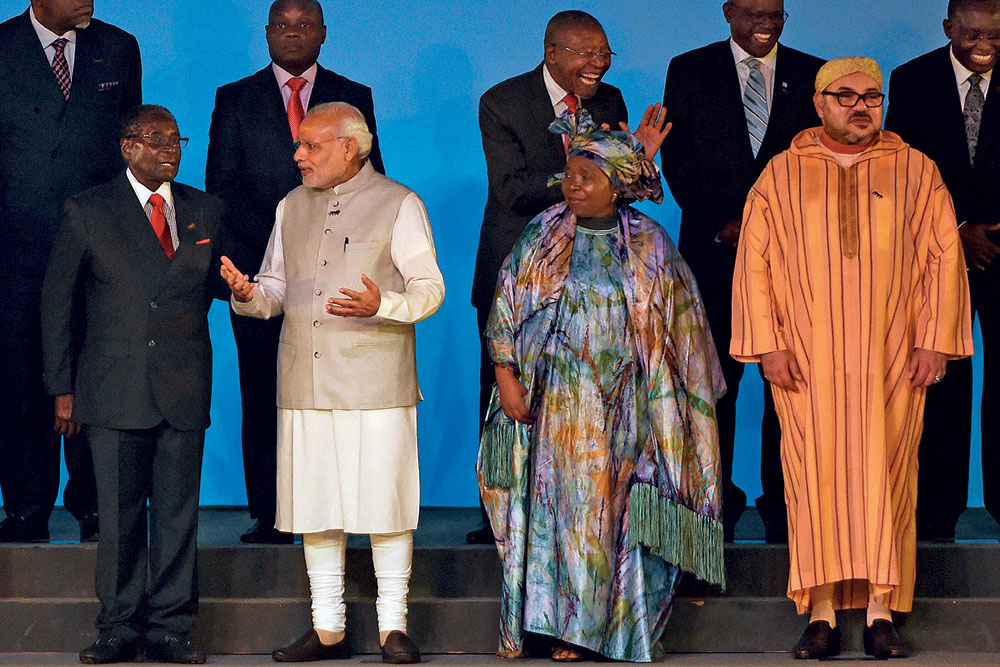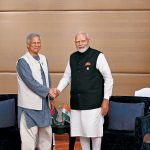Modi’s Moment
India should use Xi Jinping’s absence from the G20 summit to promote its unifying vision for the new world order
 Ram Madhav
Ram Madhav
 Ram Madhav
Ram Madhav
 |
07 Sep, 2023
|
07 Sep, 2023
/wp-content/uploads/2023/09/Modimoment1.jpg)
(Illustration: Saurabh Singh)
US PRESIDENT JOE BIDEN was “disappointed” that Chinese President Xi Jinping is not attending the G20 summit in New Delhi. Prime Minister Narendra Modi need not be. Instead, he should now use the forum to effectively articulate his vision for the Global South as distinct from Xi’s, which he described euphemistically at the recently concluded BRICS summit in Johannesburg, South Africa as the “voice of the emerging economies and developing countries”.
China wishes to challenge the current global order using the expanded BRICS forum which will now have 11 members with the inclusion of Argentina, Egypt, Iran, Ethiopia, the UAE and Saudi Arabia. Xi gave enough hints in his speech towards that end. Although he claimed that China does not have any hegemonic ambitions, his categorical assertion that “ganging up to form exclusive groups and packaging their own rules as international norms are… unacceptable”, or his open snub that “we do not barter away principles, succumb to external pressure, or act as vassals of others”, clearly betrays his intention to challenge the West-led world order.
India’s stand at the BRICS summit, articulated by Modi, was markedly different. Modi presented BRICS as the “voice of the Global South” but his emphasis was on moving forward “together with all the countries on the motto of ‘One Earth, One Family, One Future’”. His vision for the Global South was of complementarity with G20 countries. By proposing to give permanent membership in G20 to the 55-member African Union (AU) using India’s presidency as an opportunity, Modi has tried to bring the Global South and the Global North closer to each other.
For the first time since he took office as president of China a decade ago, Xi Jinping is skipping a G20 summit. Experts will debate the reasons for many weeks. The economic health of China to the personal health of Xi will be examined. It will be seen as a deliberate snub to India at a time when both countries are engaged in a serious exercise to resolve the border dispute.
There could be some truth in all these analyses. China’s economy is facing its worst-ever crisis. It may not collapse, but it is most likely to plateau in the near future. The major concern for China is the loss of credibility of its government in the eyes of its citizens. People no longer believe in Xi’s ability to come to their rescue in the event of a crisis. As a result, citizen spending has dwindled by almost 50 per cent, leading to a corresponding rise in savings rates. The Chinese government has now formed a commission to encourage the spending rates of the citizens.
Where Xi Jinping wants developing countries to rise as an anti-West bloc under his leadership, Modi does not harbour such antipathy towards anybody. He wants India to lend its voice to the global South for it to be able to work judiciously with the global North
On the personal front, as his age advances, Xi is increasingly becoming rigid and ruthless, a trait Mao Zedong, too, demonstrated in the 1960s and 1970s. The “Xi Jinping Thought” that the Chinese Communist Party (CPC) adopted officially in 2018 grew into a cult along the same lines as Mao’s cult. Political purges are not new for communist regimes. Stalin did it in the Soviet Union. Mao did the same in China. Xi, too, has demonstrated the same savagery since he became the supreme leader.
Bo Xilai, his main rival in the 2010s, languishes in some unknown prison along with the former security chief, Zhou Yongkang. His so-called “anti-corruption drive” took down an estimated 2.3 million government officials, including Politburo member Sun Zhengcai. While Hu Jintao was forcefully ‘escorted out’ of the CPC conclave last year, his close aide Ling Jihua also became a victim of Xi’s purge.
Jack Ma, the high-profile CEO of Alibaba, the company he founded in 1999 and took to great heights, suddenly disappeared in November 2020 only to surface a few months later as an ordinary citizen. Last known, he was teaching at a university in Tokyo. In June this year, the sudden disappearance of the new foreign minister of China, Qin Gong, rattled the country. While Wang Yi, the former foreign minister, was recalled by Xi to take over the ministry, Qin’s whereabouts are unknown.
Not everything seems stable in the powerful People’s Liberation Army (PLA) either after Xi purged two generals on the Central Military Commission, the highest military body of the country. One of the generals died of cancer during the investigation while the other languishes in jail.
All these issues of internal strife could have forced Xi to keep away from the G20 summit in New Delhi. But stated or unstated, Xi is also throwing a gauntlet at Modi on the issue of the leadership of the Global South. He knew that Delhi would be Modi’s show and a confident India would certainly present a strong case for its leadership of the Global South.
Modi’s positioning of himself as the “voice of the Global South” as against Xi’s efforts to emerge as the sole voice of the developing world is certainly a major irritant for the latter. However, there is an important distinction. Where the Chinese leader wants developing countries to rise as an anti-West bloc under his leadership, Modi doesn’t harbour such antipathy. He instead wants India to lend its voice to the Global South in order for it to be able to work judiciously with the Global North.

India’s rise is inevitable. The world has by now acknowledged this fact. Børge Brende, president of the World Economic Forum (WEF), predicted recently that the world will be led by G3 countries—the US, China and India—by 2035. The world may still remain multipolar but India is bound to occupy an important place in the emerging post-pandemic world order. For Xi, already bogged down by an acute rivalry with the US, India’s rise will be an unenviable challenge.
India needs to traverse cautiously in the unfolding geostrategic scenario. G20 leadership in this crucial period has provided India with an excellent opportunity to present its vision before the world’s leading powers. The absence of China will only help India in that sense.
Modi presented BRICS as the ‘voice of the global South’ but his emphasis was on moving forward ‘together with all the countries on the motto of ‘one earth, one family, one future’’. His vision for the global South was of complementarity with G20 countries
However, India must note that there is a great amount of scorn and scepticism in the West about this new formulation. In India also, many see it as a return to the non-alignment politics of the 1950s and 1960s. Some analysts declared the Global South as a chimera while some others dismissed it as an unviable alignment. Some even want the concept to be ‘retired’.
Due to its historical baggage, the concept of the Global South is seen with suspicion and contempt by some. The coining of the term is attributed to Carl Oglesby, a New Left American writer, in 1969. He used it in the context of the Vietnam War, alleging that the North was exerting “dominance over global South”.
As the first world led by America and the second world led by the Soviet Union got entangled in a Cold War, some countries got together calling themselves the Third World developing countries. “South-South cooperation” was a concept articulated by leaders like then Indian Prime Minister Indira Gandhi in the early 1980s.
Returning to that terminology, Modi needs to cautiously wade through the definitional dystopia. Although the Global South is the flavour of the season with leaders from Biden to António Guterres to Ajay Banga, to many others liberally using the phrase, it still lacks a coherent vision and interpretation.
The Global South’s interpretation as a group of victim nations of colonisation may be passé for India as it has largely overcome the syndrome. What is more, Indians rule over their erstwhile colonisers today. From the US to the UK to Ireland, countries in the North have Indian-origin citizens at the helm of affairs in governments. However, anti-colonialism is still a catchy sentiment for countries in Africa and Latin America. The turmoil in Africa, in Niger and elsewhere, is essentially against the former French colonisers. China cleverly exploits those sentiments to further its geostrategic agenda.
The other interpretations of the Global South in terms of poverty, backwardness, poor educational and healthcare infrastructure are also a thing of the past for many countries. While a number of middle powers emerged in the Global South as strong economies, they also demonstrated their ability to support less privileged neighbours.
When India talks about the Global South, it should not be about economy alone although G20 is primarily focused on economic cooperation. The immediate challenges that humanity is facing range from climate issues to pandemics to man-made or natural disasters, to newer technologies like artificial intelligence (AI), robotics, bitcoins and blockchains. Additionally, the wave of woke ideologies vitiating social and academic ecosystems in the Global North is fast spreading to countries in the Global South, too.

Given the size of more than 80 per cent of the global population, the Global South can seriously aggravate these challenges to the detriment of humanity. That calls for active involvement of the region in finding answers to these challenges. Sadly, the multilateral institutional mechanism evolved in the post- World War II period continues to be dominated by the northern powers. The Global South, which contributes more than 45 per cent of global GDP, has got no more than a 15 per cent stake in multilateral financial institutions like the World Bank.
In all these decades, the northern powers used their influence in multilateral institutions to push their agendas and eventually became responsible for most of the global challenges. The climate crisis is their creation; so are other challenges. The insatiable hunger for consumption in order to maintain high standards of living led to an exploitative world order wherein wars became a means for achieving geo-economic objectives. Countries in the Global South became victims of this world order.
When India talks about the global South, it should not be on economy alone although G20 is more focused on economic cooperation. The more immediate challenges that humanity faces range from climate issues to pandemics to man-made or natural disasters, to newer technologies like AI
This tendency to use multilateral institutions to pursue their own agenda continues to this day in the form of unilateral imposition of sanctions, as well as military and technological interventions to topple regimes and create instability. Concepts like ‘global commons’ are used to further exploit the resources of the world.
India should champion the cause of the Global South in the context of providing an alternative vision and direction to the world. The cultural and civilisational richness of the Global South has the potential to provide credible solutions to many of the new challenges. Its view of the Earth, humanity, society and happiness is markedly different from that of the industrialised North.
The immediate need will be to reform multilateral institutions to give greater space and voice to the Global South. That helps in formulating credible and future-friendly policies and programmes for the benefit of all. The failure of that will only allow authoritarian regimes like China to force their way into the global arena riding anti-West sentiments. Another Cold War is then inevitable.
As the leader of G20 this year, India has two choices—provide a coherent framework for leading the Global South in order to reform global multilateralism together with the North; or allow it to be dismantled by countries like China in an effort to bring in their own version of global dominance.
Reform or replace—this Hobson’s choice should be the sine qua non for India at the G20 summit in New Delhi.

/wp-content/uploads/2025/07/Cover_Dalai-Lama.jpg)












More Columns
Trump Restarts Tariff War With the World Open
‘Why Do You Want The Headache of Two Dalai Lamas’ Lhendup G Bhutia
Predicting the Rain Anoop Mahajan